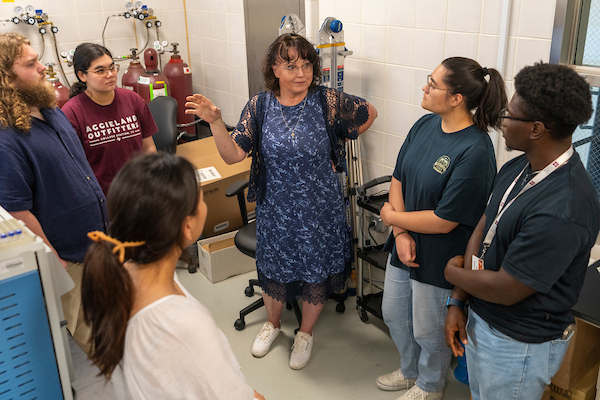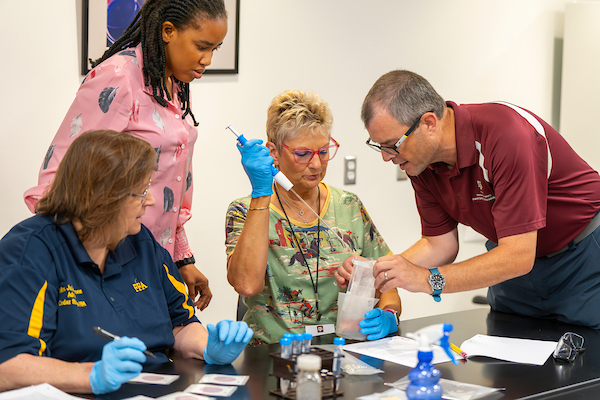High school teachers, undergraduate students gain food science experience in AgriLife Research-led project
Innovative high-impact, hands-on learning builds awareness of, interest in food science and technology
A new Texas A&M AgriLife Research-led project is engaging teachers and students in food science and nutrition research to help build a greater overall interest in academic and professional opportunities in food science.
A cadre of six high school science, career technology and other educators from Texas, Georgia and Indiana recently participated in a five-day Food Science Summer Research Experience in the Texas A&M College of Agriculture and Life Sciences Department of Food Science and Technology. Shortly after the teacher visit, eight undergraduate students from Texas A&M University and Prairie View A&M University came to the department for a four-week education and training program.
These groups were some of the first participants in a three-year, $1 million-plus project funded by the U.S. Department of Agriculture National Institute of Food and Agriculture, NIFA.
“This project integrates research and educational strategies,” said Susanne Talcott, Ph.D., AgriLife Research professor in the Department of Food Science and Technology, College Station. Talcott serves as the principal investigator for the project.
Filling the need for future food scientists
Many of these students will become the food scientists of tomorrow, Talcott said. That is why the project is focused on engaging teachers and students in innovative, high-impact, hands-on learning experiences that will build awareness of and interest in food science and technology as a possible career.
“Job openings in this field have been outpacing the number of food science graduates in the U.S. and worldwide,” she said. “Many students are unaware of food science programs in college and the multiple STEM-related applied career opportunities available to them within the food and dietary supplement industry.”
Talcott said many high schools currently have culinary programs but no food science curriculum and “we aim to change this.”
A primary objective of this project is to engage teachers in inquiry-based learning and to inspire them to collaborate with others who share their scientific interests, Talcott said. Another is to encourage students to learn research, critical thinking and problem-solving skills and introduce them to various careers associated with food science and technology.

During their visit, the teachers attended presentations on functional foods, food microbiology, food safety, food engineering, and nutrition and dietetics, as well as food science and technology programs, careers and student opportunities.
The teachers also toured laboratory facilities, getting hands-on experience by participating in some of the research being done in the department, plus held discussions on lesson plan development, leadership, and other methods for engaging students in science and related STEM subjects.
The participating students, who not only represented the food science and technology discipline, but also dietetics, biology, chemistry, biochemistry and allied health, were introduced to food safety principles, laboratory procedures and food technology. They also engaged in practical laboratory demonstrations, including applications of clinical trials, cellular agriculture, glucose content in human plasma, and microbiology techniques for foods and beverages.
Engaging teachers and students in food science
Over the course of the project, additional groups of teachers and students will gain firsthand experience with food science concepts, facilities and research.
Robert Strong, Ph.D., associate professor in the Department of Agricultural Leadership, Education and Communications and project co-investigator, said the transdisciplinary project’s use of contemporary and innovative food science research and curricula will help increase interest in the field and better prepare those students who choose it as a career.
“The scope of this project required that we get experts from various disciplines, including food science and technology, education and leadership, dietetics, nutrition and biochemistry involved so we could address the many aspects and opportunities in food science and technology,” he said.
Project co-investigator Ra’sheedah Richardson, Ph.D., director of educational development and recognition at the Texas A&M Center for Teaching Excellence, said inviting both teachers and students to participate in practical research in the department represents a powerful opportunity.
“The hands-on research experiences the teachers and students are given will better allow them to share scientific concepts and content,” Richardson said. “It will help the teachers design classroom laboratory activities and processes for students from the perspective of firsthand research experience. We want to partner with teachers and students to connect classroom concepts and content to real-world issues and applications.”
Teacher and student experiences
Julie Throne, who has taught for 22 years and currently teaches agriscience to grades 9-12 at Cedar Shoals High School in Athens, Georgia, participated in the recent project activities. She said the knowledge and hands-on lab experience from the visit to Texas A&M will be directly applicable to her teaching efforts.

“I have more than 20 students who are involved in agriscience research competitions, so the additional exposure to food science and nutrition that I had during this time will be helpful in my directing them in their research,” she said. “It will also allow me to focus more specifically on teaching about how nutrition research is done.”
Throne, who also worked as a food inspector for the Georgia Department of Agriculture for 17 years, said she intends to share with her students the various opportunities in food science, such as product development, marketing, consumer research, data research and AI application.
Marcus Wascom, a Texas A&M food science and technology undergraduate participating in the project, said the experience helped him hone his technical skills in laboratory procedures and research.
“We were required to do lab safety trainings that taught us how to work in lab environments and were introduced to a variety of lab equipment and technology,” Wascom said. “The hands-on lab work was very interesting, and we got lab experience related to how clinical studies are conducted as well as on fermentation and cellular biology. It was a great lesson in incorporating and applying food science concepts.”
Wascom said while his initial hope in project participation was to “get some face time with the professors,” he was also impressed with the amount of interest and support given by graduate and postdoctoral students in the labs.
“I’m not sure where I want to go in my food science career, but I know I’d like to be a student researcher as an undergrad,” he said. “It was a great experience to spend time with faculty, see what was happening in their labs, and learn from graduate students and those working on their doctoral degrees.”
Wascom said the experience helped him become a student researcher and has shown him other possible pathways in academics or food science.
“If there was ever any doubt, I now know that my home is in food science,” he said. “I am even considering graduate school because this research program helped me to realize what I am capable of doing.”
More about the project
Other project co-investigators include Stephen Talcott, Ph.D., professor, Department of Food Science and Technology, and Janet Antwi, Ph.D., assistant professor of nutrition and dietetics at Prairie View A&M University. Shannon Schmidt, Ph.D., and Rebecca Creasy, Ph.D., both in the Department of Food Science and Technology, serve as student coordinator and project support, respectively.
Together, project participants are developing experiential learning modules, student activity video modules and a website of downloadable modules for teachers and students. They are also developing ways to help high school and college students connect with a network of researchers and others involved in the project to access scientific presentations and peer-reviewed publications.
Other teaching and training aspects of the project will include summer camps for high school students, developing sustainable learning communities and providing grade-adaptable high-impact learning activities and lesson plans. The project will also offer workshops and training activities for high school teachers and undergraduate students, as well as consulting and counseling for teachers, high school students, graduate students and postdoctoral students.


